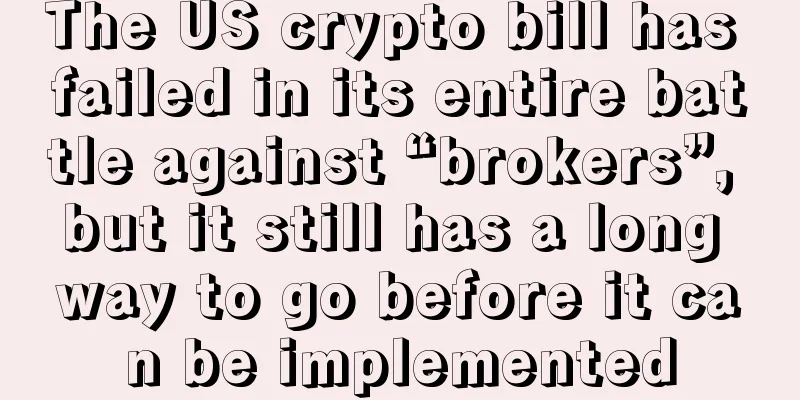The US crypto bill has failed in its entire battle against “brokers”, but it still has a long way to go before it can be implemented

|
Wu Shuo Author | Tan Shu Editor of this issue | Colin Wu Compared with the other side of the ocean where a document "knocked down" an industry, the definition of "broker" in the United States is undergoing complex debates and struggles, and there is still a long way to go before final implementation.The Problem with Cryptocurrency Industry Statement in the Infrastructure Investment and Jobs Act On August 10, the U.S. Senate passed the Infrastructure Investment and Jobs Act (1) by a 69-30 majority. The bill has attracted the attention of cryptocurrency industry practitioners because it involves the taxation of cryptocurrencies. The bill explicitly requires cryptocurrency "brokers" to report transaction information to the tax authorities, and the definition of brokers is "any person who facilitates digital asset transactions on behalf of others." It is estimated that in the next ten years, the cryptocurrency sector will generate $28 billion in tax revenue. However, the definition of "broker" in cryptocurrency transactions in the bill seems too broad in the eyes of the cryptocurrency industry. For example, a miner is obviously a person who facilitates digital asset transactions on behalf of others, but it is obviously unrealistic to require miners to collect information on both parties to the transaction. This is why some lawmakers proposed amendments. Amendment based on cryptocurrency “brokers” Therefore, several senators, including Ron Wyden, Cynthia Lummis and Pat Toomey, proposed the [Wyden-Lummis-Toomey Amendment](2). These senators have a relatively professional understanding of cryptocurrencies, and Cynthia Lummis even holds Bitcoin. The amendment makes a wide range of exclusions for cryptocurrency "brokers". This amendment has also received joint [support] from industry organizations such as Coinbase, Square, and Coin Center(3). However, not long after the Wyden-Lummis-Toomey Amendment was proposed, several other senators, Rob Portman, Kyrsten Sinema, and Mark Warner, proposed the [Warner-Portman Amendment](4), which only excluded two types of "brokers", namely POW miners and private key software providers. In comparison, this proposal seemed to lack understanding of the cryptocurrency industry, and thus attracted widespread opposition within the industry. Subsequently, the main sponsors of the two amendments (except Ron Wyden) reached a compromise and formed a new amendment, which was based on the Wyden-Lummis-Toomey amendment, but only removed the part that exempted "digital assets and their core protocol developers" from being considered brokers. However, due to time constraints, the amendment required unanimous consent from senators to pass. The plan was initially opposed by Senator Richard Shelby from Alabama, and was therefore declared a failure. Implementation of the Act Next, the bill will be submitted to the House of Representatives for discussion in September. Generally speaking, bills passed by the senators will not encounter much resistance in the House of Representatives. However, four congressmen led by Tom Emmer have sent an open letter to other congressmen, [calling on] (5) the congressmen to revise the vague definition of "broker" in the bill. After the House of Representatives passes this bill, the U.S. Internal Revenue Service (IRS) will begin to formulate implementation details for the submission of relevant information, which will be another long process. Therefore, even if the bill is passed according to the current wording, the IRS still needs to resolve the definition of "broker". If highly decentralized organizations such as miners and non-custodial wallets are regarded as exchanges and other institutions, and they are forced to collect and report trader information, these participants will inevitably be "driven out" of the United States, which may not be what policymakers want to see. |
<<: Retail giant Walmart is "testing the waters" and is hiring a cryptocurrency product manager
Recommend
Facial features of men who cannot trust their love words
In life, there are always some men who are irresp...
Analysis of whether a woman's eyebrows are good for her husband
Sparse eyebrows In physiognomy, we can judge whet...
Wells Fargo develops blockchain banking prototype to improve efficiency and speed of cross-border correspondent banking payments
Rage Comment : Wells Fargo, ANZ and SWIFT have co...
Love to go hiking on weekends
The weekend is a very pleasant time for everyone....
Men with this kind of face are all very vicious inside.
The main reason why we are often deceived and nee...
What are the physical characteristics of a rich man and a noble woman?
Money has become a label to measure a person'...
What does it mean to have a mole on the palm? Is it good to have a mole on the palm?
Regarding the issue of mole appearance, many peop...
Is it good for a man to have high cheekbones? Is it good for a man to have high cheekbones?
In physiognomy, the importance of cheekbones is n...
The bull market is coming. Should you wait and see or go all in when buying mining machines?
Huge profits return to the mining industry. From ...
Weekly report of Bitcoin.com: BCH inventory in mid-2019 (June 24-July 1)
As of 10:00 am on June 24,the total Bitcoin netwo...
Blockchain 2.0 (IV): Smart assets build a decentralized asset management system
Article summary image: What are Smart Assets? Sma...
HaoBTC Bitcoin Blockchain Daily: Attention is declining day by day
Blockchain News Express : 1. After Brexit, the EU...
Dash mining machine can actually mine Bitcoin! The profit exceeds mining Dash?
Introduction: Dash has many advantages. It can tr...
What are the facial features of a man with evil intentions? Analysis of his nose and lips!
How people get along with each other: The key lie...
Can forehead wrinkles attract love? I have no charm.
If a person can attract love luck, it means that ...









